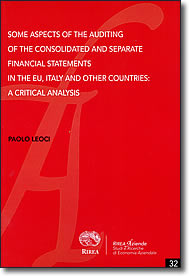
DOI: 10.17408/CA/591061
The author tries to give a unified picture of the main problems connected to the auditing activity, with particular regard to the consolidated financial statements, that the auditor encounters in carrying out his work. The auditor finds himself in a strange position which is not found in any other profession, because he is pressed by two opposed needs: to carefully check, even by the recourse to a professional skepticism throughout the audit and to recognize the possibility of a material misstatement due to facts or behavior indicating irregularities and, particularly, to the shareholders of the company for the audit, usually unknown. Spontaneously the doubt rises that the controlled does not want that the controller is more free and neutral on its work. It would then be a preventive and instinctive defense.
The main objective of the work is to assess whether the rules in force in the various countries, especially in Italy, about the review of private sector balance sheets, consolidated or not, prevent the investors from being affected by the dangers arising from negligence, incompetence, bad faith of some directors of companies that are sourcing in the stock markets.
Paolo Leoci graduated cum laude at Bari University in 1992 at the faculty of Economics. Previously he had spent long study periods in the USA and in Germany. He held a lectures cycle (Accounting and auditing, etc.) at the Finance Academy of Moscow. In 2003 he became Associate Professor in Business Management at the University of Lecce. Since 2008 he is member of the scientific committee of the Russian review “Mir Novoi Ekonomiki”. Leoci is the author of several monographs and books: Imprese, ambiente e qualità della vita: i Bilanci di Sostenibilità (Cacucci, 2007); La Partita tripla russa e il suo autore: un metodo contabile del tutto dimenticato (RIREA, 2008); Investimenti e costituzione di imprese nella Federazione Russa. Le società, il sistema contabile e il regime fiscale (McGraw-Hill, 2011); La Responsabilità Sociale delle aziende ed il Bilancio Sociale: Novità e prospettive (Cacucci, 2012); La politica doganale dell’Unione Europea: alcuni regimi e prassi contabile (RIREA, 2013).


